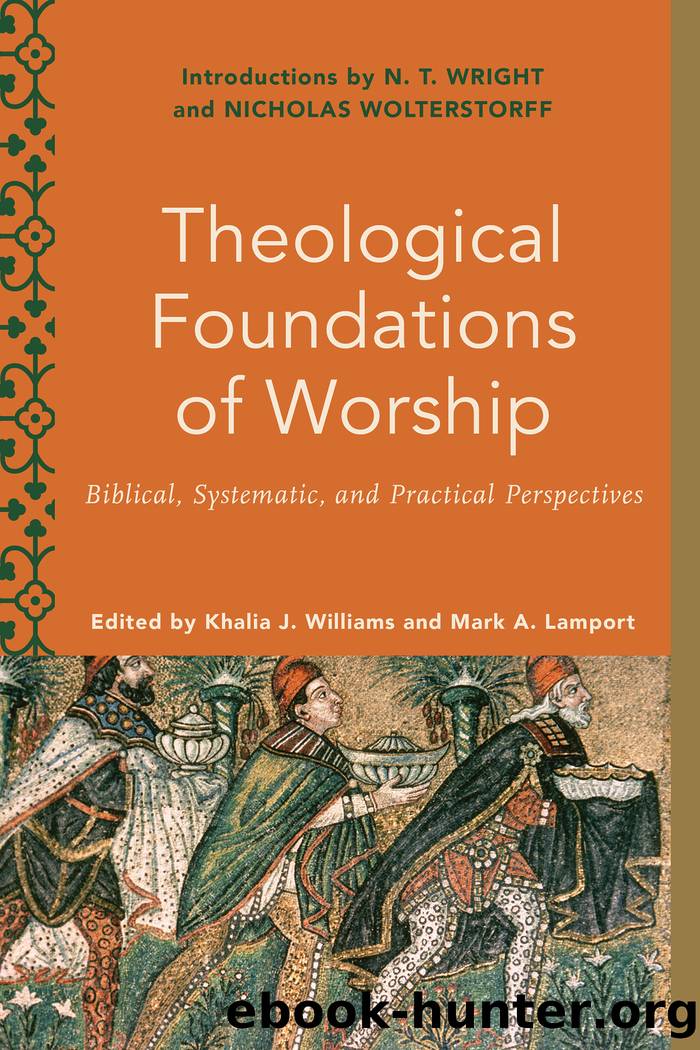Theological Foundations of Worship by Khalia J. Williams

Author:Khalia J. Williams
Language: eng
Format: epub
Tags: Worship/Theology;REL055020;REL067000
Publisher: Baker Publishing Group
Published: 2021-06-10T00:00:00+00:00
Intersection: How Mission Correlates with Worship Practice
Worship and mission are joined by the most intimate of bonds, for they are both expressive of the same purpose: the return of creatures to the God who made them. They are, moreover, both perfectly accomplished by Jesus Christ, in whom the churchâs worship is acceptable to God and at whose command the church engages in its mission. Worship and mission, while distinguishable from each other, are mutually implicated realities. The churchâs worship depends upon a prior mission and necessarily leads its participants to engage in mission, yet without subordinating the one to the other.
As was noted above, the origin of all mission is the missio Dei, âmission of God,â by which God moves beyond Godself and into the world he has created in order to bring that creation into union with himself. Through the missions of the Son and Holy Spirit, human creatures are caught up into the life of God, reconciled to our Creator, and elevated beyond what we would be capable of by nature, even if our nature had remained unfallen. Our sharing in the divine mission leads us at once into both worship and mission.
Jesusâs mission reaches its culmination in his cry upon the cross, âIt is finished.â By this singular act, he has accomplished the mission given to him by the Father, reconciling humanity to God. This completion of Christâs mission is also a perfect act of worship, as attested in those traditions that understand Jesusâs death as sacrificial (Rom. 3:25; 1 Cor. 5:7; Eph. 5:2; Hebrews; 1 John 2:2; 4:10) and in Jesusâs own high-priestly prayer in John 17.
This unity of worship and mission can also be discerned in the Pauline letters, where Paul interprets his own apostolic mission, and support for it, in terms drawn from the world of the temple. It is a liturgy (service: Rom. 15:27; 2 Cor. 9:12; Phil. 2:25, 30), a libation (Phil. 2:17), and a sacrifice offered to God (Phil. 4:18). It aims at making acceptable the âoffering of the Gentilesâ (Rom. 15:16â17), suggesting that the objects of the churchâs mission are themselves the matter of a sacrifice offered to God. Indeed, the whole of the Christian life can be construed as a sacrifice (Rom. 12:1), with mission as one particular application of this principle.8 That they are bound together is clear enough, but their precise relationship needs to be more clearly specified or we risk serious distortions.
Worship Depends on Mission
Every act of Christian worship is preceded by mission, and this can be seen in two primary ways. First, all Christian worship is preceded by mission because it is the result of the divine missions of the Son and Holy Spirit. The church is a creature of the divine missions, and only because of them is there a church to offer worship.9 This leads us to the second way in which worship is preceded by mission: Christianity is not a natural state but rather a supernatural gift of God. The Christian community,
Download
This site does not store any files on its server. We only index and link to content provided by other sites. Please contact the content providers to delete copyright contents if any and email us, we'll remove relevant links or contents immediately.
The Secret Power of Speaking God's Word by Joyce Meyer(3169)
Signature in the Cell: DNA and the Evidence for Intelligent Design by Stephen C. Meyer(3125)
Real Sex by Lauren F. Winner(3012)
The Holy Spirit by Billy Graham(2942)
The Gnostic Gospels by Pagels Elaine(2527)
Jesus by Paul Johnson(2351)
Devil, The by Almond Philip C(2324)
23:27 by H. L. Roberts(2245)
The Nativity by Geza Vermes(2226)
Chosen by God by R. C. Sproul(2159)
All Things New by John Eldredge(2157)
Angels of God: The Bible, the Church and the Heavenly Hosts by Mike Aquilina(1953)
The Return of the Gods by Erich von Daniken(1927)
Angels by Billy Graham(1920)
Knowing God by J.I. Packer(1852)
Jesus of Nazareth by Joseph Ratzinger(1802)
The Gnostic Gospel of St. Thomas by Tau Malachi(1782)
Evidence of the Afterlife by Jeffrey Long(1779)
How To Be Born Again by Billy Graham(1775)
